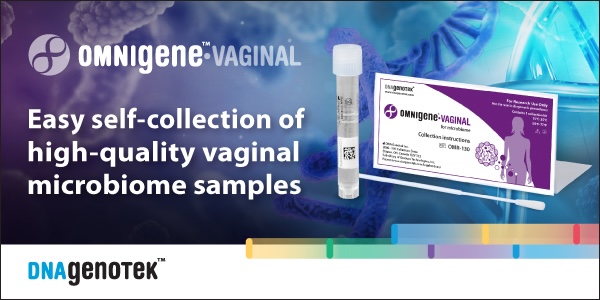The vaginal microbiome – the community of bacteria and other microorganisms that live in the vagina – is emerging as one of the most important factors in women’s health. Scientists are discovering how these tiny organisms influence everything from fertility and pregnancy outcomes to infection risk and overall wellness.
This growing understanding has sparked a wave of innovation. Companies like Evvy, Tiny Health, JunoBio, Fertilysis, and Varinos are bringing new tests to market, while researchers worldwide are uncovering connections between vaginal bacteria and major health conditions. But turning these discoveries into reliable diagnostics often depends on something surprisingly basic: Keeping samples stable from collection to analysis.
The Promise of Vaginal Microbiome Science
Research is revealing how profoundly the vaginal microbiome influences women’s health outcomes. Studies show clear links between bacterial makeup and fertility success, or infection prevention. Scientists have found that certain microbial patterns help women conceive, while imbalances contribute to conditions like bacterial vaginosis that affect millions of women.
Perhaps most exciting, the vaginal microbiome may serve as an early warning system for pregnancy problems. Changes in bacterial communities have been linked to preterm birth risk, potentially helping doctors intervene before complications occur.
These discoveries are driving innovation across multiple areas – from personalized probiotics designed for individual bacterial profiles to tests that spot health risks before symptoms appear. But turning this potential into reality depends on solving a basic problem: Getting high-quality, accurate samples consistently and atscale.
Current Methods Create Challenges
Today’s vaginal microbiome collection approaches lack standardization, require careful temperature control and quick processing. While these methods have helped enable important scientific discoveries, they create significant obstacles for research and discovery in women’s health as organizations and academic institutions plan studies to develop potential methods for disease and health detection.
In 2025, Dr. Ana Dofia Da Silva et al published the review article, ‘The untapped potential of vaginal microbiome diagnostics for improving women’s health’ in Frontiers in Cellular and Infection Microbiology, concluding that, “the lack of standardisation currently limits our ability to reliably identify consistent microbial associations and that it is crucial to conduct further research focusing on standardised and optimised protocols to improve data comparability, enhance reproducibility, and support the development of a robust, disease-specific microbial biomarker database.” The development of improved sampling and extraction methods are critical for researchers to further innovation in this field. Overcoming challenges with sample stability and preservation allow for greater potential reach of sampling while ensuring a standardized microbiome sample upfront, thus minimizing bias along the way. As large studies take place to connect the vaginal microbiome to states of health and disease, these become difficult projects to coordinate and increase the risk of sample or data failure from improper techniques. While optimal sample collection and preservation may not solve every problem, it gives the best upfront possibility for downstream protocols to generate usable, insightful data.
The Sample Processing Challenge
Beyond keeping samples stable lies another hurdle: Getting the most information out of each sample. Vaginal samples have unique characteristics with each containing its own unique makeup of bacteria, viruses and fungi that create the microbiome. Processing these samples requires sophisticated extraction technologies to lyse these organisms to obtain the usable nucleic acid material for genetic testing.
General processing approaches may fail to lyse enough microbes to provide the required nucleic acids thus failing to capture the full picture of what’s happening in the vaginal environment. This becomes particularly problematic when working with samples that have low amounts of microbes to start with and can impact the consistency of samples over time.
A Room Temperature Solution
The OMNIgene™•VAGINAL collection device´ changes the game by keeping both DNA and RNA stable at normal room temperature for up to 30 days. Completely removing the need for cold shipping.
Researchers can now design studies without the challenge of cold-chain shipping or worries their samples will degrade en route to the lab, while companies can serve customers through regular mail instead of expensive temperature-controlled shipping.
The OMNIgene™•XTRACT ULTRA processing system provides the other half of the solution with technology innovations to improve nucleic acid extraction from challenging sample types. This optimized approach efficiently lyses gram-negative and gram-positive bacteria while preserving the genetic material needed for analysis.
“Proper validation of tools used in microbiome research is key to ensuring accurate capture and representation of microbial profiles. OMNIgene™•VAGINAL kits have been demonstrated to preserve high-quality microbial DNA and RNA during transport and for up to 30 days storage at room temperature without introducing detectable bias based on robust internal validation work at DNA Genotek™”, says Brice LeFrancois, Ph.D. Senior Manager, R&D, DNA Genotek™.
Proven Results in Real Studies
Published research shows these advances work in real-world situations. Studies in Applied and Environmental Microbiology and Microbiology Spectrum have successfully used theOMNIgene™•VAGINAL devices to track probiotic treatments and bacterial changes over time. Field research published in BMC Infectious Diseases proves the methods work in challenging environments, including studies conducted in Kenya looking at how water sources and sanitation affect vaginal bacteria.
These publications confirm the technology works in practice, not just theory.
Changing How Organizations Operate
Room-temperature collection creates clear benefits across applications. Universities can design multi-location studies without complex refrigeration coordination, while commercial companies eliminate expensive shipping and reach new markets.
Better processing consistency delivers reliable results whether supporting academic research or powering consumer tests, becoming the foundation for sophisticated services that track changes over time.
As the vaginal microbiome field grows, organizations that master these sample handling advances gain competitive advantages. The ability to collect and process samples reliably determines what studies can be conducted, which populations can be served, and how sophisticated the resulting products can be.
“Having the appropriate tools to collect and stabilize human microbiome samples, combined with methodologies to efficiently recover nucleic acids from all microbial species without introducing bias, is particularly critical for microbiome studies. These tools must be able to capture unique microbial profiles representative of the in vivo state of the samples as closely as possible. To support vaginal microbiome research, DNA Genotek has developed the OMNIgene™•VAGINAL and OMNIgene™•XTRACT ULTRA technologies to capture and stabilize samples in the field and provide efficient recovery of high-quality nucleic acids”, says Brice LeFrancoise, Ph.D. Senior Manager, R&D, DNA Genotek™.
The barriers that have historically limited vaginal microbiome research and testing can now be overcome and the companies that embrace these solutions today will define tomorrow’s women’s health landscape.
Ready to Advance Your Vaginal Microbiome Research or Testing Platform? Download comprehensive technical specifications and validation data for OMNIgene™•VAGINAL device and OMNIgene™•XTRACT ULTRA extraction kit on DNA Genotek™’s website.




